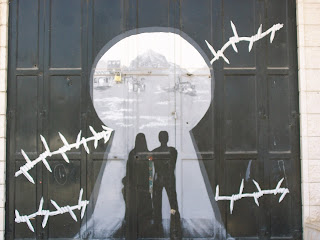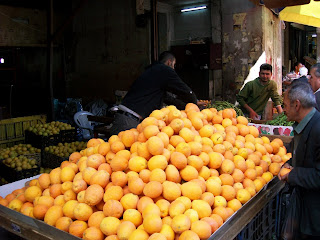 After the recent protest in Abu-Dis
After the recent protest in Abu-Dis
The interviewees name has been changed in this post for reasons of confidentiality. Mustafa is 39 years old and teaches in schools in Abu-Dis and Ramallah. He lives in Abu-Dis with his wife, also a teacher, and their three young children. He is a kind and friendly man and works especially with disadvantaged students.
It is a cliche, but it is true, that everyone in Palestine has a story about Israel and the occupation. I have got to know Mustafa well over the last couple of months and only recently did he tell me about his experiences.
Mustafa was 16 years old when the first
intifada (uprising) broke out in 1987. Like thousands of others he and his brother joined in the mass civil disobedience against the occupation.
"I did what most of us did at that time, throwing stones at Israeli tanks and soldiers. I also wrote anti-Israel graffiti on walls and raised the Palestinian flag in a mosque. For this I spent 1 year in prison".
"For the first two weeks they kept me in a cupboard size cell. I could only stand or crouch down. After that i was moved to a bigger cell. When they interrogated me they tied me to a chair in painful positions for hours. They hit me after asking questions. Then they would throw freezing water over me".
I ask Mustafa how he felt during this interrogation. He said, "I felt good. First you feel very afraid. During the first punches you are in pain and very scared. Then, when you don't say anything, it's a good feeling. You feel strong".
He then tells me about a 'room' in the prison. With his heavily accented English i think he is saying 'bedroom', but after some clarification it turns out that he is saying 'birdroom'.
"In the prison there was a room called the 'birdroom'. It is where they took all the prisoners to try and make them become spies for Israel. If you refused, which i always did, they hit you and threw you across the room. I was taken many times to the 'birdroom'".
Mustafa's story is common in Palestine. It seems almost everyone has either spent time or has a friend or family member who is, or has been, in Israeli prisons. In fact, Mustafa's sentence of 1 year was relatively short. But, as he says, "one day is enough in Israeli prisons, so one year was hell".
Despite his ordeal Mustafa is proud of the first
intifada, and he says it was better in some ways than the second
intifada (2000-2005).
"The first
intifada came from the people, and everyone was united. In the second it was in the hands of the different organisations, and they controlled it more. Also, during and after the second
intifada there was more of a division between rich and poor in Palestine. Now the government men, even in Gaza, have big houses and don't think about the people".
Mustafa is scathing about the current Palestinian leadership and the leaderships of all the different organisations. "Now, i hate Fateh, i hate Hamas, i hate Islamic Jihad, i hate the Egyptian government, and i hate the Jordanian government. They all just look for their own interests, and they don't care about the people".
"I love the kind man. I love the man who looks to those who are suffering and poor and doesn't forget about them".
The day after speaking to Mustafa i interviewed some boys that i happened to pass in the street.
I ask them what the problems are in Abu-Dis. The reply immediately, "the Israeli soldiers. They hit us. Its like a game for them". I ask them if many children are arrested for throwing stones. One replies, "Yes many, sometimes they are in prison for years. They miss the important years in school". He points to his friend, "He was shot four times in his leg by soldiers". His friend looks about 14 years old.
So, it seems, there has been little change since Mustafa was arrested over twenty years ago.
There was one big difference between the boys and Mustafa. Whereas Mustafa was not excited by the prospect of a third
intifada, as soon as i asked the boys about it their faces lit up and an excited murmur circulated around the group.
After so little has changed in two decades, should anyone really be surprised if and when there is a third
intifada?






















































